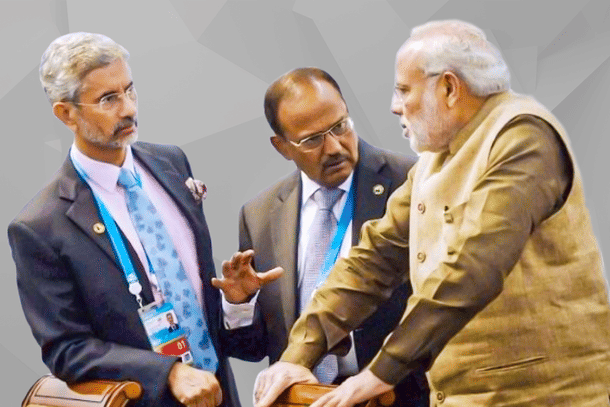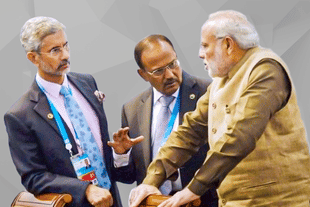Defence
Inside Modi Government’s National Security Architecture: New Roles For Old Hands
Ujjwal Shrotryia
Jul 05, 2024, 03:42 PM | Updated 05:39 PM IST
Save & read from anywhere!
Bookmark stories for easy access on any device or the Swarajya app.


On Wednesday (3 July), the Government of India elevated former Research and Analysis Wing (R&AW) chief and the current Deputy National Security Advisor (Deputy NSA) Rajinder Khanna to the position of Additional National Security Advisor.
According to reports, this is the first instance where somebody has been appointed to fill the post of additional NSA. The post always existed, but nobody was appointed so far.
A 1978-batch IPS officer of the Odisha cadre, Khanna served as a Deputy NSA from January 2018 until now and headed its Technology and Intelligence Section.
A Pakistan and terrorism expert, Khanna, before his stint as Deputy NSA, served as R&AW chief and led its operations wing.
Moreover, T V Ravichandran, the special director of Intelligence Bureau (IB), and Pawan Kapoor, an Indian Foreign Service (IFS) officer, both have been appointed as new Deputy NSAs.
The Deputy NSA post vacated by Khanna will be filled by T V Ravichandran. Another Deputy NSA post held by Vikram Misri, which will become vacant on 15 July as he starts work as Foreign Secretary, will be filled by Pawan Kapoor.
The third Deputy NSA position is held by retired IPS officer Pankaj Singh, who deals with internal security.
Khanna, Ravichandran, Singh and Kapoor will work under the current NSA Ajit Doval in the National Security Council Secretariat (NSCS), the apex body dealing with all internal and external security-related matters of the country.
The NSCS is led by Prime Minister Narendra Modi, with NSA Ajit Doval serving as its secretary.
With these appointments, Prime Minister Modi has done minimal changes in the NSCS which will ensure continuity in India's policy on dealing with Islamist terrorism originating from Pakistan, Khalistani extremism and separatism under covert support from the US and overt support by Canada, and various internal security issues.
During his and Vikram Misri's time as Deputy NSAs, several Pakistani-origin terrorists and Khalistanis were killed by unknown gunmen on a motorbike in Pakistan and Canada. (You can read Swarajya's coverage of this here.)
Pakistan, the US, and Canadian governments allege that these killings are linked to and paid for by the Indian security establishment.
The Canadian government even listed India as the second-biggest foreign threat to Canada's democracy after China. Its Prime Minister Justin Trudeau accused agents of the Indian government of killing Khalistani terrorist and Canadian citizen Hardeep Singh Nijjar.
The US government claimed that it busted an alleged murder plot by Indian agents of another Khalistani terrorist, Gurpatwant Singh Pannu. The US, in fact, tried to taint India's entire higher national security establishment, including NSA Ajit Doval and former R&AW chief Samant Goel, as the brains behind the alleged murder plot of Pannu.
If going by any of these allegations, then retaining the same officers and re-shuffling the remaining in the NSCS sends a clear signal that India is most likely to double down and hunt for India's enemies wherever they hide.
This intent was reflected in Defence Minister Rajnath Singh's warning in April when he asserted that "We will not spare any of them (terrorists)…will kill them in India and outside if required".
He further said, naming Pakistan, that we will give them a befitting reply, "muh tod jawab denge," and hunt them down even in Pakistan.
This thinking is also reflected with no changes in Modi 3.0's Cabinet Committee on Security, where none of the four ministers — Defence Minister Rajnath Singh, Finance Minister Nirmala Sitharaman, Foreign Minister S Jaishankar, and Home Minister Amit Shah — were changed.
Staff Writer at Swarajya. Writes on Indian Military and Defence.





